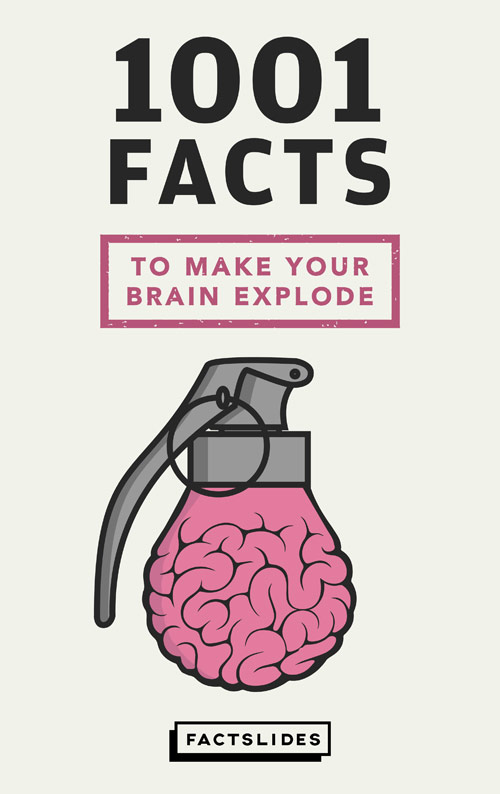If you have a pizza with radius Z and thickness A, its volume is =
Pi*Z*Z*A
Pi*Z*Z*A
♦ SOURCE
♺ SHARE
Ancient Babylonians did math in base 60 instead of base 10. That's why we have 60 seconds in a minute and 360 degrees in a circle.
♦ SOURCE
♺ SHARE
Students who chew gum have better math test scores than those who do not, a study found.
♦ SOURCE
♺ SHARE
2,520 is the smallest number that can be exactly divided by all the numbers 1 to 10.
♦ SOURCE
♺ SHARE
123 - 45 - 67 + 89 = 100.
123 + 4 - 5 + 67 - 89 = 100.
123 - 4 - 5 - 6 - 7 + 8 - 9 = 100.
1 + 23 - 4 + 5 + 6 + 78 - 9 = 100.
♦ SOURCE
♺ SHARE
There are 177,147 ways to tie a tie, according to mathematicians.
♦ SOURCE
♺ SHARE
In 1900, all the world's mathematical knowledge could be written in about 80 books; today it would fill more than 100,000 books.
♦ SOURCE
♺ SHARE
The birthday paradox says that in a group of just 23 people, there's a 50% chance that at least two will have the same birthday.
♦ SOURCE
♺ SHARE
Multiplying 21978 by 4 reverses the order of the numbers: 87912.
♦ SOURCE
♺ SHARE
Isaac Newton's Principia Mathematica contained a simple calculation error that went unnoticed for 300 years.
♦ SOURCE
♺ SHARE
2200 years ago, Eratosthenes estimated the Earth's circumference using math, without ever leaving Egypt. He was remarkably accurate. Christopher Columbus later studied him.
♦ SOURCE
♺ SHARE
Mathematician Paul Erdos could calculate in his head, given a person's age, how many seconds they had lived, when he was just 4 years old.
♦ SOURCE
♺ SHARE
In middle school, 74% of girls express interest in Science, Technology, Engineering and Math, but when choosing a college major, just 0.4% of high school girls select computer science.
♦ SOURCE
♺ SHARE
The largest prime number ever found is more than 22 million digits long.
♦ SOURCE
♺ SHARE
Multiplying 21,978 by 4 reverses the order of the numbers to 87,912.
♦ SOURCE
♺ SHARE
The discoveries of Greek mathematicians such as Pythagoras, Euclid, and Archimedes, are still used in mathematical teaching today.
♦ SOURCE
♺ SHARE
1 divided by 998001 gives a complete sequence from 000 to 999 in order.
♦ SOURCE
♺ SHARE
2,520 is the smallest number that can be exactly divided by all the numbers 1 to 10.
♦ SOURCE
♺ SHARE
Arabic numerals, like the ones we use today in English, were actually invented in India.
♦ SOURCE
♺ SHARE
The Millennium Prize is a US$1 million award given to whoever can solve any 1 of 7 math problems, but to date only 1 of the problems has been solved.
♦ SOURCE
♺ SHARE
A physicist faced with a fine for running a stop sign in 2012 proved his innocence by publishing a mathematical paper. He even won a prize for his efforts.
♦ SOURCE
♺ SHARE
2013 was the first year since 1432 that's a rearrangement of four consecutive numbers.
♦ SOURCE
♺ SHARE
Philosopher René Descartes is most well known for the saying "I think, therefore I am," but he also developed the XY-coordinate system.
♦ SOURCE
♺ SHARE
Almost 50% of adults in England can't do basic maths.
♦ SOURCE
♺ SHARE
In 1900, all the world's mathematical knowledge could be written in about 80 books; today it would fill more than 100,000.
♦ SOURCE
♺ SHARE
The highest accuracy calculations at NASA use just 15 decimals of Pi.
♦ SOURCE
♺ SHARE
The most prolific mathematician of the 20th Century, Paul Erdos, used amphetamine to fuel 20-hour number benders.
♦ SOURCE
♺ SHARE
In many Israeli schools, algebra is taught without the use of the symbol "+" as it looks like a Christian cross. They use an inverted "T" instead.
♦ SOURCE
♺ SHARE
Taking Pi to 39 digits allows you to measure the circumference of the observable universe to within the width of a single hydrogen atom.
♦ SOURCE
♺ SHARE
The word ‘hundred' derives from ‘hundra' in Old Norse, which originally meant 120.
♦ SOURCE
♺ SHARE
Newton invented/discovered calculus in about the same amount of time the average student learns it.
♦ SOURCE
♺ SHARE



















